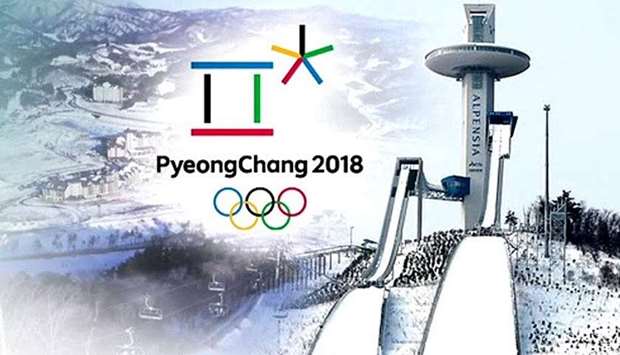Kim Jong-Un on Monday gave the first indication that North Korea could participate in next month's Winter Olympics in the South, despite tensions over Pyongyang's nuclear weapons programme.
‘I sincerely hope the Pyeongchang Winter Olympics will be staged successfully,’ said Kim, the North Korean leader, in his new year's address to the nation.
‘We are willing to take necessary measures including to dispatch our delegation.
‘For this purpose, authorities of the North and South would be able to meet in the near future,’ he said.
Lee Hee-Beom, the head of the Pyeongchang Olympic Organising Committee welcomed Kim's comments.
‘We actively welcome the North's suggestion that it is willing to engage in talks for the participation in the Olympics’, Lee told AFP.
‘We've been preparing for the Olympics on the assumption that the North will eventually take part in the games’, he said, adding that all athletes, including North Koreans, would feel at home during their stay in Pyeongchang.
- 'Peace Olympics' -
He said relevant government authorities of the two Koreas should hold talks to discuss details although there was no immediate response from the South's government.
Seoul and organisers have billed the Winter Games which begin on February 9 as a ‘peace Olympics’ and have been keen for the North to take part.
Two North Korean athletes -- pairs figure skaters Ryom Tae-Ok and Kim Ju-Sik -- have qualified for the Games but the North Korean Olympic Committee missed an October 30 deadline to confirm to the International Skating Union that they would participate.
The pair could still compete if given an invitation by the International Olympic Committee.
The Winter Olympic main venues are just 80 kilometres (50 miles) from the heavily fortified border with the North and the build-up to the event has been overshadowed by tensions running high over the Pyongyang's escalating nuclear and missile tests.
Kim said the Olympics would ‘serve as a good chance to display our Korean people's grace toward the world.’
‘The year 2018 is a significant year for both the North and the South, with the North marking the 70th anniversary of its birth and the South hosting the Winter Olympics.’
- 'Unstable state' -
Kim did strike one note of caution. ‘The sharp military tension between the North and the South must be eased and a peaceful atmosphere should be in place,’ he said.
‘As long as an unstable state which is neither a war nor peace continues, the North and the South cannot guarantee their scheduled events (including the Olympics) will be successfully staged, sit down for talks or move forward for reunification.’
Professor Kim Hyun-Wook at the Korea National Diplomatic Academy said the North was trying to use the Olympics to improve ties with the South while tensions with the US show no signs of abating.
‘The US will find it awkward to put brakes on inter-Korean dialogue focused on Pyeongchang,’ he said.
North Korea's past participation in sporting events in the South has largely depended on the political and military situation, though they did send a full team to the 2014 Asian Games in Incheon, near Seoul.
‘It is quite noteworthy that the North's leader himself says the North is willing to participate in Pyeongchang,’ Professor Yang Moo-Jin of the University of North Korean Studies in Seoul told AFP. ‘The chances of the North coming to the Olympics now seem to be more than 80 percent.’
North and South Korea have been divided by a demilitarised zone since the end of the 1950-53 Korean war.
South Korean president Moon Jae-In last month proposed delaying Seoul's annual joint military exercises with the US until after the Games.
The Key Resolve and Foal Eagle drills usually start in late February or early March and run until the end of April, usually contributing to a spike in tensions, with Pyongyang condemning the exercises as rehearsals for invasion.

